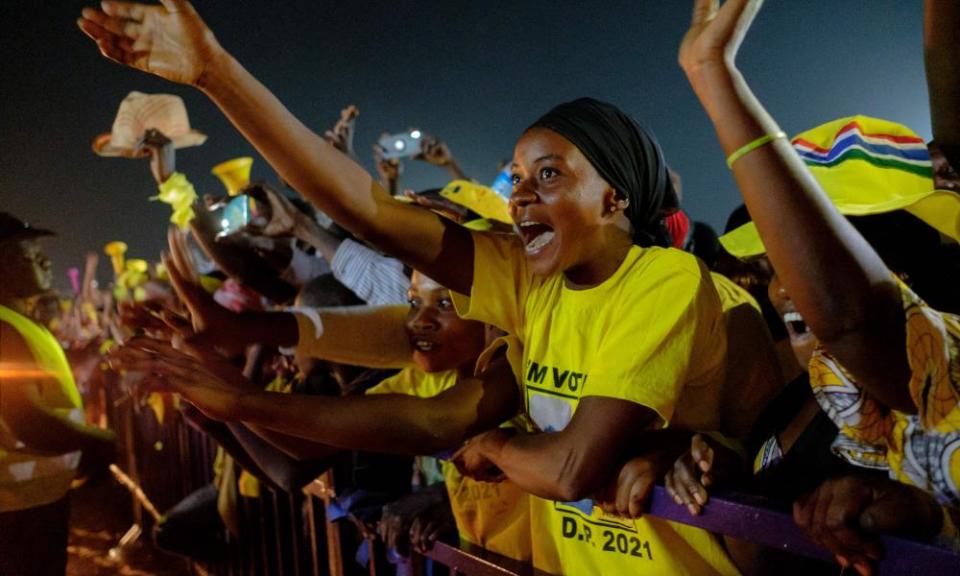The Gambia to vote for first time since Jammeh forced into exile

Gambians are heading to the polls on Saturday for the first time since the former president Yahya Jammeh was forced into exile after 22 years in power.
Jammeh, whose rule was marred by allegations of torture, extrajudicial killings and rape, fled to Equatorial Guinea in 2017 when United Nations-backed regional coalition forces staged a military intervention after his refusal to concede electoral defeat.
Now some fear the man who beat him in the 2016 election, Adama Barrow, a former property developer, is tightening his own grip on power.
The 56-year-old one-time security guard promised sweeping democratic reforms and launched a truth, reconciliation and reparations commission to investigate human rights violations under Jammeh’s rule. But he has since broken a key election promise to serve only three years as a transitional leader, opting instead to serve out a full five-year term and run for re-election.
That led to widespread protests in late 2019 and early 2020, which security forces dispersed with teargas and rubber bullets. Police closed down two radio stations that reported on the demonstrations.
“Yes, human rights have improved since Jammeh left, but there has been a slip,” said Pa Louis Sambou, a lawyer and founding fellow at the rule-of-law advocacy group Democracy Watch Gambia.
In September Barrow struck a deal with Jammeh’s former Alliance for Patriotic Reorientation and Construction (APRC) party, to the horror of those who suffered under that party’s brutal regime.
“He put politics, and his interest in winning this election, ahead of the nation’s interests,” said Fatou Baldeh, a grassroots organiser who works with survivors of sexual violence under Jammeh’s regime. “He is so desperate to maintain power that he doesn’t care how that impacts his citizens.”
After repeated delays, the truth commission’s final report was tabled late last week, but it has not yet been made public.
Seedy Njie, a deputy spokesperson for Barrow’s party, could not be reached for comment.
At a rally for Barrow’s National People’s party on Tuesday night, supporters of the president said they were not bothered by his new alliance or his refusal to step down early.
“He did break his promise, but there’s a reason – he wants to continue the work that he is doing,” said Fanta Sisay, an 18-year-old recent graduate. “Three years is not enough for the work … Five years is also not enough.”
Supporters pointed to tangible actions they believe Barrow has taken, such as building roads and improving sewage infrastructure.
Jammeh has rejected his former party’s alliance with Barrow. Instead he has thrown his support behind an anti-Barrow coalition led by the opposition candidate Mama Kandeh. Jammeh has been dialling in from exile to speak at Kandeh’s rallies.
Kandeh, however, is not expected to have a real shot at winning. Instead, the president’s main opponent is a man who was once his mentor. Ousainou Darboe, of the United Democratic party (UDP), was Jammeh’s chief rival in the 1996, 2001 and 2006 elections, but was imprisoned in 2016 and prevented from running that year.
Barrow, who had never before held office, stood for the UDP in his place. After winning, he appointed Darboe to his cabinet and they worked together until 2019, when the president formed his own breakaway party.
“[Darboe] empowers youth like me,” said Fatima Jammeh, a 25-year-old UDP volunteer. “I believe that when the party wins, we the youth are going to get what we deserve.”
Others say Darboe, at 73, is too old to lead. He has not spoken at campaign events since fracturing his hip on 29 November.
“If he was a younger man I would vote for Darboe,” said Abdoulaye Habib, a 29-year-old hotel supervisor, who said he was leaning towards Barrow despite not particularly liking the president.
Sambou, from Democracy Watch Gambia, said Saturday’s election would be a “very important moment”, not because of who wins but because of its significance for the country’s democratic transition.
“It is the first presidential election post-Jammeh, so obviously it is important that people have confidence in the process,” he said. “During the Jammeh era, that confidence was not there.”
Additional reporting by Pa Modou Cham.

 Yahoo Finance
Yahoo Finance 